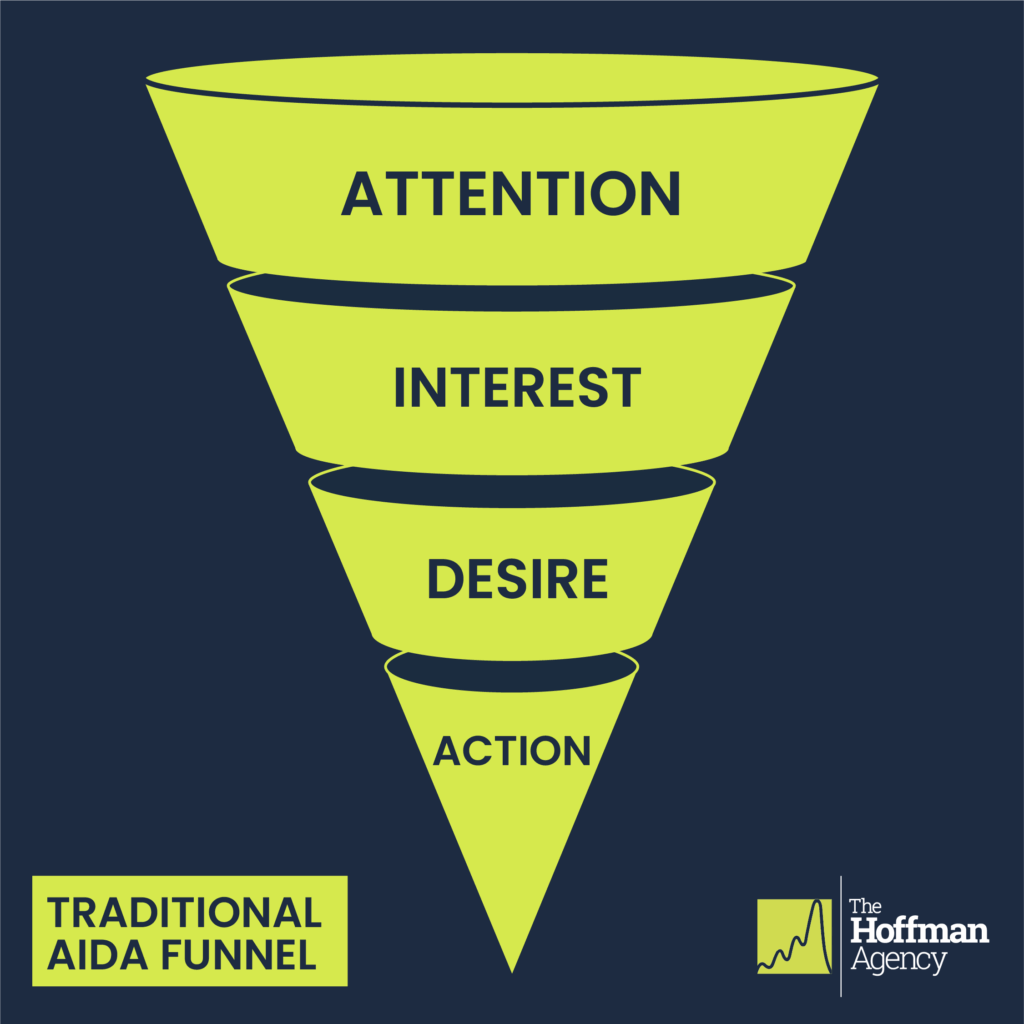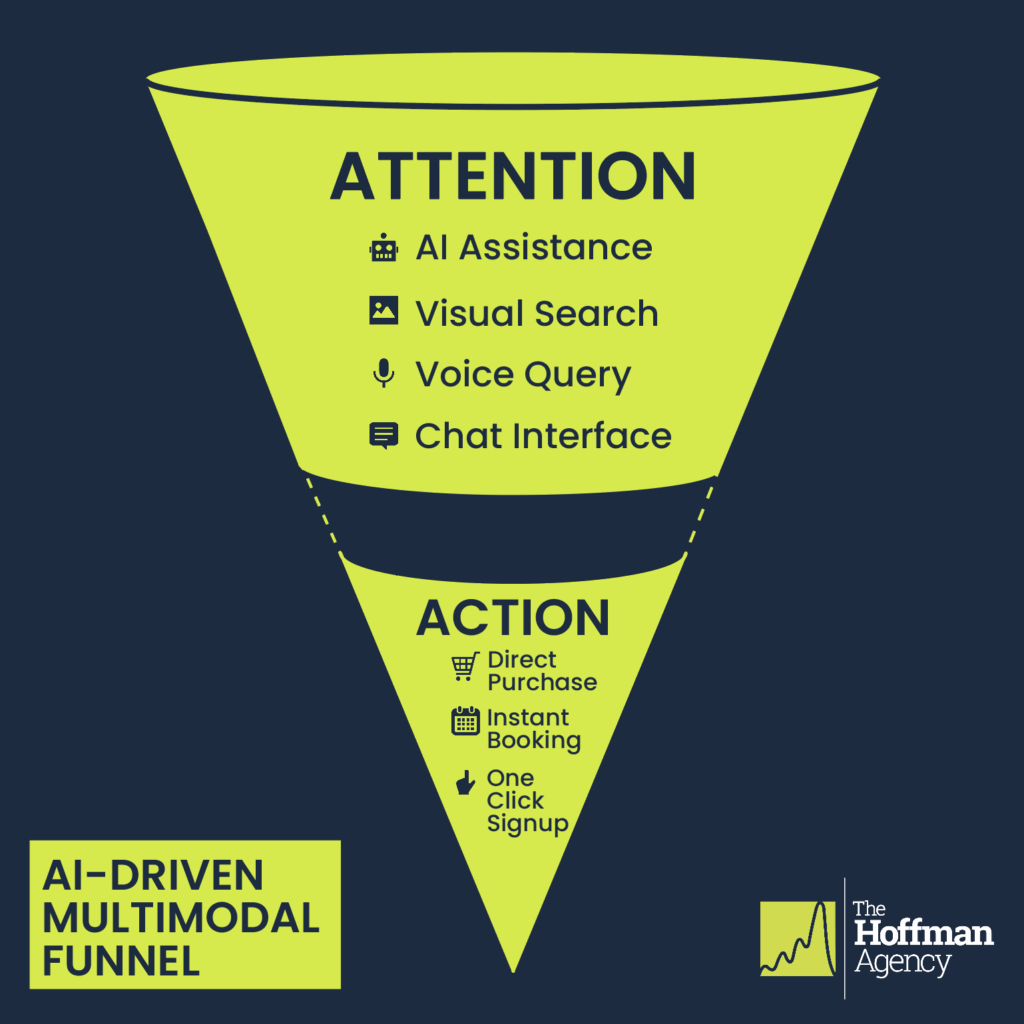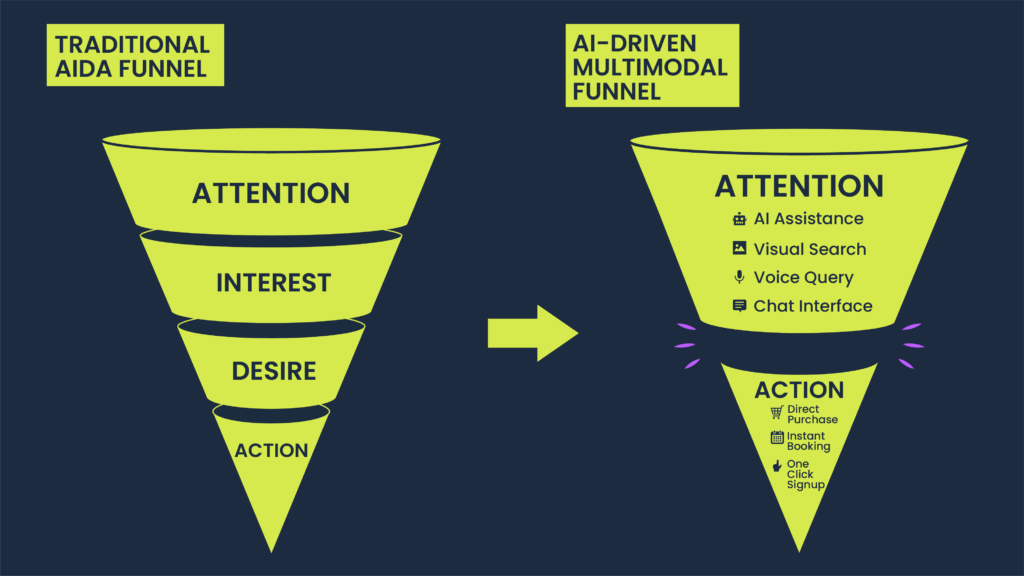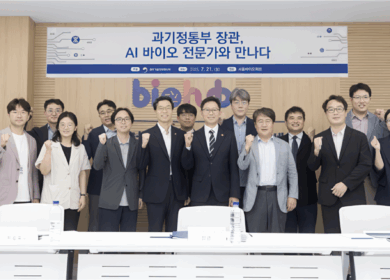Most marketers and communicators will at least once encounter the famous AIDA funnel. This simplified psychological approach to the buying decisions humans make before finalizing a purchase has remained largely unchanged for decades, and continues to be taught at universities worldwide to this day.
At The Hoffman Agency, we still consider AIDA the fundamental logical framework for enabling trust-focused sales funnels that are grounded in facts and supported by compelling narratives. This approach sends prospective buyers on a journey of exploration and discovery.
We help companies solve hard business problems – in other words, while we do excellent PR to build your reputation and visibility, we understand that every spending has to come with ROI, eventually helping with sales through reputation building or directly selling through marketing efforts, which we also support through digital marketing efforts and smart marketing-led campaigns. (We probably offer more than you think. Please get in touch with us on any business challenge you would like to tackle!)

While the AIDA framework remains strong, we’re witnessing a seismic shift on the horizon:
“The emergence of AI is propelling prospect buyers directly from Attention to Action – faster than ever before, without traditional barriers and competitive friction.”
We call this the Multimodal Funnel.
The AI Revolution: Speed Beyond Precedent

Considering the latest developments in AI platforms like ChatGPT, Gemini, Claude, and DeepSeek, the pace at which these systems evolve far surpasses any previous technological advancement in the industry.
Companies across sectors are racing to integrate “AI” into their offerings, spanning both hardware and software solutions. Meta, as a prime example, is developing their open-source LLM model Llama (now in iteration 4) while simultaneously advancing Meta wearables, including the Ray-Ban Meta Glasses and their Quest headsets (such as the Quest 3S). As of this writing of the article, Meta is further expected to launch glasses in collaboration with Oakley, and wearables like smartwatches and AirPods-rivaling headphones.
Tech giants Apple, Google, and Microsoft are all following similar trajectories, embedding “intelligence” into their devices to enable users to wear technology that will fundamentally transform how we live and work in the future.
The Search Paradigm Under Pressure
The data tells a compelling story of rapidly shifting user behavior. Google’s dominance in search, while still substantial, is showing signs of erosion. Google’s global search market share fell below 90% in late 2024 for the first time in years, hovering in the high 89% range throughout 2025. Even more striking, ChatGPT has captured a 4.33% search market share, representing a significant foothold in what was once considered Google’s impenetrable territory.
The impact extends beyond mere market share statistics. Google’s AI Overviews are causing dramatic traffic declines for websites, with research showing 15-64% drops in organic traffic depending on industry and search type. Some publishers report even more severe impacts, with MailOnline experiencing a 56% click-through rate drop when AI Overviews appear in search results.
Perhaps most telling is Google’s own internal acknowledgment of this trend. Google executives describe search traffic decline as “inevitable,” expecting Search to lose traffic to their own Gemini platform or rival AI engines like ChatGPT. This represents a fundamental shift from the traditional search model that has powered Google’s advertising empire for over two decades.
User Behavior: The Real Revolution
The shift isn’t just about technology, it’s about human behavior. Studies indicate that 62% of people now use AI chatbots for information gathering, representing a dramatic change in how we approach knowledge discovery.
Users are gravitating toward conversational AI interfaces that provide direct answers rather than navigating through multiple search results.
This behavioral change threatens the very foundation of Google’s advertising model. AI search engines send 96% less referral traffic to websites compared to Google’s traditional search function, fundamentally disrupting the ecosystem that connects searchers with content creators and advertisers.
The Wearable AI Revolution: Closing the Experience Gap
Meta, among other tech giants, recognizes this paradigm shift as their opportunity to become “the next big thing” in search and exploration, ultimately closing the gap between the user, the product, and the purchase decision. This strategic pivot isn’t just about technology, it’s about reimagining the entire consumer journey.
The Strategic Shift: From Ads to AI Hardware
One might wonder at first why companies that traditionally built their revenue models around advertising, like Google and Meta, are pivoting their focus toward AI development so aggressively. While it’s evident that AI-powered search is beginning to capture market share from traditional Google search, as mentioned above, the underlying reality lies in the hardware revolution.
Even at OpenAI, famous for its ChatGPT LLM, this revolution is driving the company’s strategy. With its newest acquisition of Jony Ive’s company “io” for 6.4 billion USD, Sam Altman, CEO of OpenAI, has clearly paved the way for his company to be not just the technological and software-based “backend/frontend” designer and supplier, but also the matching hardware manufacturer for the end user to ultimately become part of everyone’s life in physical form.
Imagine a Future Where Everyone Wears AI Glasses:
Humans will see something they desire and simply ask whichever AI engine powers their wearables for more details or purchase options. Users will never touch a keyboard, scroll through endless lists, or deliberate over which platform to buy from. None of the learned, traditional behaviors that Google and other search engines conditioned us to follow will matter anymore. The next generation of users, upcoming generations, will not understand the “cumbersome” exploratory journey we were all taught by conventional search engines.
This future is rapidly materializing. Apple is rumored to launch AI glasses by 2026 as part of their AI push, while Google is partnering with Warby Parker and Gentle Monster to develop AI-powered smart glasses. Meta’s Ray-Ban Meta Glasses are already setting the standard for seamless AI integration in wearable technology – and with Meta giving away Llama open source LLM models for free, they are not being generous, they are being deliberate that their AI will later (hopefully) dominate wearables and other products, investing billions of dollars in the process to achieve this target.
The Loyalty Landscape: Platform Fluidity vs. Brand Affinity
In reality, humans demonstrate remarkable platform fluidity in their purchasing behavior. Only 8% of global consumers remain loyal to brands from which they’ve always bought, according to Nielsen research. More striking, brand loyalty dropped from 80% in 2022 to 70% in 2023, signaling a fundamental shift in consumer behavior.
Consumers are increasingly platform-agnostic while maintaining selective brand preferences. 34% of consumers no longer consider brands when making purchasing decisions, with only 54% of respondents buying branded products when they are on sale. This represents a dramatic departure from traditional brand loyalty patterns that have driven marketing strategies for decades.
The shift toward non-brand-focused buying behavior is particularly pronounced in voice and AI-mediated commerce. Voice shopping is predicted to reach $40 billion by 2025 in the US and UK alone, with consumers prioritizing convenience and efficiency over brand discovery.
The Multimodal Communication Imperative: A Time-Sensitive Opportunity

This paradigm shift represents an unprecedented opportunity for both B2B and B2C brands to fundamentally reshuffle their market visibility – but only if they move with decisive speed. We’re witnessing a brief window where early adopters can establish dominant positions in AI-powered discovery before the market saturates with competitors fighting for the same AI real estate. The brands that act now, while AI search patterns are still forming and optimization strategies remain nascent, will capture disproportionate visibility advantages that become exponentially harder to achieve once the entire market pivots to AI-native approaches.
This isn’t merely about maintaining current market position, it’s about the potential for smaller, more agile brands to leapfrog established competitors who remain anchored to traditional search and discovery methods. The playing field is being reset, and the winners will be determined not by historical market share, but by speed of AI adoption and strategic implementation.
Leading the Multimodal Funnel Future:
The Hoffman Agency’s AI-First Approach to Client Success
At The Hoffman Agency, we’ve invested deeply in AI platform expertise to ensure our clients don’t just survive the transition to AI-empowered multimodal discovery, they understand it and take a leadership role in it. While other agencies are still debating whether AI is a threat or opportunity, or are stuck at the “all that matters is a lot of ‘trusted content'” to be visible on AI search, we’ve built comprehensive capabilities that position our clients at the forefront of this paradigm shift.
One Challenge, One Team: Content created for the age of AI-driven communications has to be done holistically. Digital strategy, research, content marketing, PR, Marketing, SEO/GEO, etc. all have to work together seamlessly to deliver on the next level of communications deliverables, without barriers and one-sided approaches.
Our AI-Native Service Portfolio
Deep AI Platform Integration: Our teams have developed deep expertise across ChatGPT, Gemini, Claude, DeepSeek, and emerging AI platforms. We don’t just monitor how your brand appears in AI responses, we actively optimize your content architecture to ensure favorable, accurate representation across all AI discovery channels.
Multimodal Content Mastery: We develop AI-first multimodal content strategies that combine text, audio, visual, and interactive elements specifically designed for AI consumption. Our content doesn’t just engage human audiences – it’s architected to be the preferred source that AI systems cite and recommend. And our team checks regularly to ensure that your brand is mentioned more frequently as content is pushed out.
Voice and Conversational AI Optimization: As voice search becomes the new battleground for brand visibility, we’ve developed specialized capabilities in optimizing client content for conversational queries, ensuring your brand emerges as the authoritative answer when prospects ask AI assistants about your industry. While SEO will stay important, GEO [Generative Engine Optimization] will be the leading differentiator in the future.
Why Choose Hoffman for AI-Driven Communications
Proven AI Crisis Management: We’ve developed rapid-response protocols for AI-generated misinformation threats, protecting our clients from the risks of AI-amplified false narratives while proactively building positive AI associations.
Cross-Platform AI Performance: We track brand visibility on traditional search engines and AI platforms simultaneously. We provide comprehensive insights into how your messaging performs when filtered through AI systems, allowing for dynamic optimization that keeps you ahead of competitors still focused solely on human audiences.
Our Global AI Council and Training Initiative
We’ve established a Global AI Council that continuously evaluates emerging AI platforms and develops ethical frameworks for client representation. Our team undergoes ongoing AI training through our HAcademy program, ensuring we stay ahead of platform updates and algorithmic changes that could impact client visibility.
Sector-Specific AI Expertise: Our deep expertise spans semiconductors, HR tech, consumer tech, quantum, AI, data centers, SaaS, and DevOps, giving us unique insights into how AI platforms prioritize and present information within your specific industry vertical.
Ready to Lead the Transition? Talk to Us About Your Hard Business Problems!
The shift from traditional search to AI-powered discovery represents the most significant change in brand communications since the advent of social media. The difference is speed – this transition is happening in months, not years.
We’re not just preparing for the multimodal funnel future, we’re already operating in it. Our clients are establishing AI platform authority while their competitors are still trying to understand what’s happening.
The question isn’t whether AI will transform how prospects discover and evaluate your brand. The question is whether you’ll be at the front of that transformation or be left behind by it.
Contact us today to discuss how our AI-first approach can secure your brand’s visibility and authority in the AI-powered multimodal landscape that’s already reshaping your industry.

